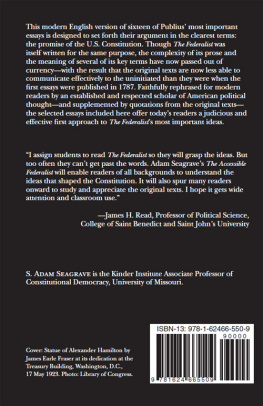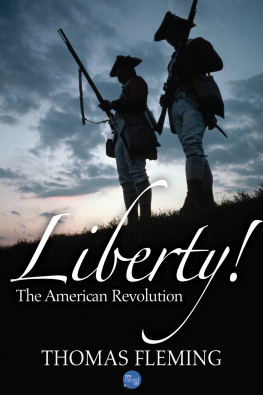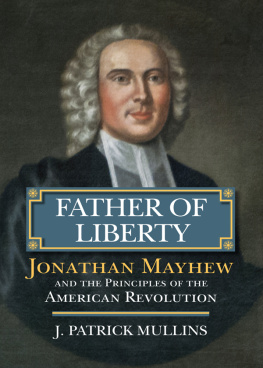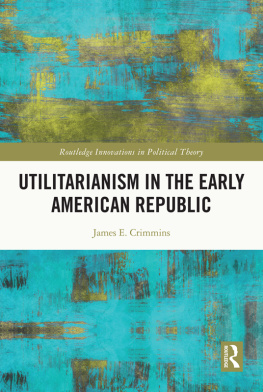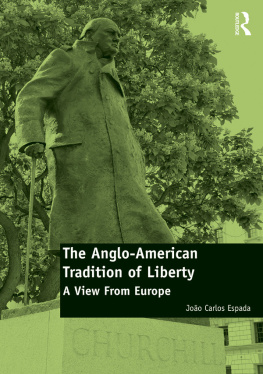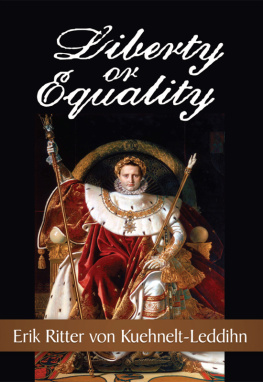2015 by the University Press of Kansas
All rights reserved
Published by the University Press of Kansas (Lawrence, Kansas 66045), which was organized by the Kansas Board of Regents and is operated and funded by Emporia State University, Fort Hays State University, Kansas State University, Pittsburg State University, the University of Kansas, and Wichita State University
Library of Congress Cataloging-in-Publication Data
Liberty and equality: the American conversation / edited by S. Adam Seagrave
pages cm (American political thought)
Includes index.
ISBN 978-0-7006-2126-2 (hardback)
ISBN 978-0-7006-2174-3 (paperback)
ISBN 978-0-7006-2162-0 (ebook)
1. LibertyUnited States. 2. EqualityUnited States. 3. DemocracyUnited States. 4. United StatesHistory. 5. United StatesPolitics and government. I. Seagrave, S. Adam.
JC599.U5L474 2015
320.973.01dc23 2015013778
British Library Cataloguing-in-Publication Data is available.
Printed in the United States of America
10987654321
The paper used in this publication is recycled and contains 30 percent postconsumer waste. It is acid free and meets the minimum requirements of the American National Standard for Permanence of Paper for Printed Library Materials Z39.48-1992.
Introduction
Nearly everyone admits the profound effect of ideas on society and politics, even if the effect of this or that set of ideas on a given society or particular political situation is often a matter of debate. As one prominent scholar recently put it, political development over time is like an ongoing spiral in which politics both drives and is driven by the formation and re-formation of ideas. Although this interaction would seem common to all human societiesbecause all or nearly all human beings regularly act under the influence of their ideas about the context within which they actthe American case may indeed present an exceptional example of this phenomenon.
This is, at any rate, what Alexander Hamilton claimed in his first words as Publius in The Federalist. According to Hamilton, it appeared to have been reserved to the American people to determine whether societies of men are really capable or not of establishing good government from reflection and choice, or whether they are forever destined to depend for their political constitutions on accident and force. As Alexis de Tocqueville would later comment in his introduction to Democracy in America, the circumstances surrounding the early development of American political society were in point of fact unique, even to a great extent unprecedented in recorded history, and it was as a direct result of this uniqueness that Tocqueville found the study of America so instructive for the Europeans of his time. The societies of men on the European continentand, for that matter, nearly every society one could point to in human historysimply could not escape the intermixture of accident and force in the development of their political constitutions. Political societies tend, as political philosophers from Aristotle to John Locke generally agreed, to grow organically out of extended families and to be governed automatically by a patriarchal figure; after this unreflective and unchosen path is begun, accident and force appear inescapable realities of the future development of such societies.
To use an analogy suggested by Tocqueville, European political societies were like individual plants in a crowded rain forest; although some measure of reflection and choice might inform the politics of such societies in the same way sunlight fights its way through the canopy to reach plants below, these plants are necessarily limited by the presence of their towering neighbors just as political societies are limited by the presence of entrenched structures of social and political influence. Such plants can only hope to grow unimpeded by the uprooting of their surrounding predecessors; and this is precisely what was attempted with disastrous results in the French Revolution.
American society, on the other hand, was like a plant in a greenhouse; having been transplanted from its native and inherently constraining surroundings, it was free to pursue a course of growth nourished to an unprecedented extent by reflection and choice. American society had no history at all during the time of its development in the seventeenth and eighteenth centuries and therefore no competing or constraining impediments in the form of long-entrenched centers of social and political power to uproot before pursuing its desired course of growth.
If there is any truth to the various claims of American exceptionalism that ring throughout American history up to the present time, it would seem to lie first and foremost in this account of our origins, constructed jointly by Publius and Tocqueville at the beginnings of their respective great works. throughout our history has, moreover, had the effect of blending and intertwining philosophy and politics, the abstract and the practical, political thought and development, to an extent truly unique among the nations of the world. As a result of this intertwining, one might very well argue that American political thought possesses both unity and distinctiveness to an extent rarely, if ever, seen in human history.
There have certainly been other momentous flowerings of philosophical inquiry clearly associated with particular political societies or nations, such as Confucianism in China, the Scottish Enlightenment, or German idealism, to name only a few. In these and other comparable cases, however, the practical political dimension was more of a consequence or corollary than a primary focus; such intellectual movements never served as recognized public doctrines informing the construction and maintenance of a political society throughout its entire history. Politics and philosophy almost invariably grow up separately from each other and proceed along parallel tracks; although they undoubtedly exert a mutual influence on each other over time, their direct and short-term interactions are much more often antagonistic than cooperative. One need only recall the famous example of Socrates, regularly repeated in various ways throughout the world since, for a conspicuous reminder of this point.


